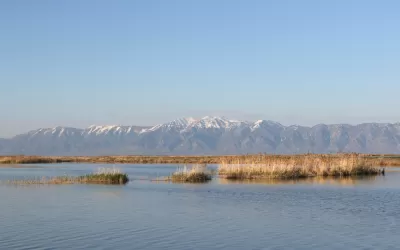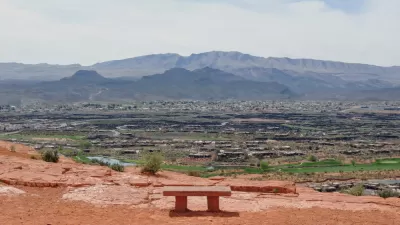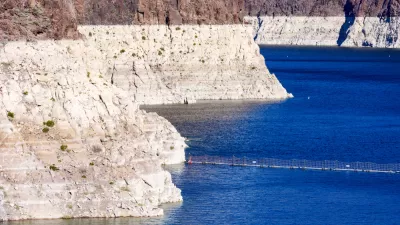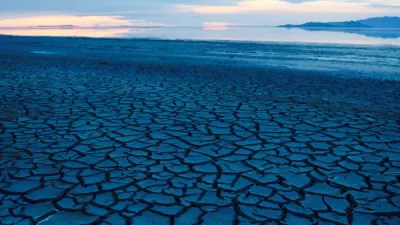The state's widespread practice of supplying unlimited untreated water to homes may be part of the reason it has to spend billions on a new pipeline and dam.

Compared to other states, Utah is among the driest, among the thirstiest, and among the fastest-growing; it's also the only state that provides, to a significant number of residential properties, "untreated agricultural water from canals, sold at an unmetered flat rate, to irrigate their lawns, gardens and landscaping."
It's called "secondary water," writes Matt Weiser at Water Deeply, and the practice stems from the unusual way that water rights in Utah developed as agricultural land gave way to residential construction.
"In nearly every other community in the nation, when farms were converted to housing the irrigation water was usually sold to other farms or allowed to remain in-stream. And new homes used treated drinking water for outdoor irrigation as well as in their kitchens and baths – all measured and billed according to a single meter at the curb."
But in Utah, 61 percent of urban water suppliers allow unlimited secondary water use, usually for $10 to $15 dollar per month.
Without meters, it's more or less impossible to obtain definitive statistics on water use in Utah, but one study did show residents of Salt Lake County—which does not supply secondary water—used 78 percent less water than residents of two neighboring counties.
Recently, the unbridled use of secondary water has been the target of criticism as Utah debates two enormous, expensive water projects. The first is a dam on the Bear River, which is the most significant tributary to the shrinking Great Salt Lake; the other is a pipeline from Lake Powell, a reservoir that has challenges of its own.
Some conservationists and fiscal conservatives would rather see the state try to reduce water use first, but both groups expect resistance. Weiser speaks to the state senator who recently introduced a bill to require meters on secondary water supplies across the entire state; the politician succinctly comments, “I can tell you right now, the cities are not going to like that.
FULL STORY: Utah, America’s Thirstiest State, Wrestles With Unmetered Water Use

Alabama: Trump Terminates Settlements for Black Communities Harmed By Raw Sewage
Trump deemed the landmark civil rights agreement “illegal DEI and environmental justice policy.”

Planetizen Federal Action Tracker
A weekly monitor of how Trump’s orders and actions are impacting planners and planning in America.

The 120 Year Old Tiny Home Villages That Sheltered San Francisco’s Earthquake Refugees
More than a century ago, San Francisco mobilized to house thousands of residents displaced by the 1906 earthquake. Could their strategy offer a model for the present?

In Both Crashes and Crime, Public Transportation is Far Safer than Driving
Contrary to popular assumptions, public transportation has far lower crash and crime rates than automobile travel. For safer communities, improve and encourage transit travel.

Report: Zoning Reforms Should Complement Nashville’s Ambitious Transit Plan
Without reform, restrictive zoning codes will limit the impact of the city’s planned transit expansion and could exclude some of the residents who depend on transit the most.

Judge Orders Release of Frozen IRA, IIJA Funding
The decision is a victory for environmental groups who charged that freezing funds for critical infrastructure and disaster response programs caused “real and irreparable harm” to communities.
Urban Design for Planners 1: Software Tools
This six-course series explores essential urban design concepts using open source software and equips planners with the tools they need to participate fully in the urban design process.
Planning for Universal Design
Learn the tools for implementing Universal Design in planning regulations.
Clanton & Associates, Inc.
Jessamine County Fiscal Court
Institute for Housing and Urban Development Studies (IHS)
City of Grandview
Harvard GSD Executive Education
Toledo-Lucas County Plan Commissions
Salt Lake City
NYU Wagner Graduate School of Public Service





























